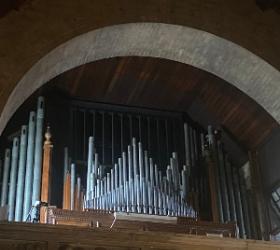
Isolde Ahlgrimm, harpsichordist, scholar, master teacher, died in Vienna on October 11, 1995. Born July 31, 1914, Ahlgrimm was recognized internationally as a major interpreter of the harpsichord repertoire, particularly the music of Johann Sebastian Bach. Her virtually complete Bach cycle was recorded between December 1951 and May 1957 for Philips of Holland. A frequent member of competition juries in Bruges and Leipzig, Ahlgrimm was known for her brilliant concerts and for her teaching at the Salzburg Mozarteum, the Vienna Hochschule für Musik, and in guest professorships at Oberlin and Southern Methodist University.
These notable facts concerning Ahlgrimm’s career are the stuff of biographical dictionaries. But there was so much more! In my article Isolde Ahlgrimm as the “Widow Bach” (The Diapason, June, 1968), I attempted to convey some sense of the lovable human being behind the public figure.
“Frau Ahlgrimm, you are so much at home in the Bach style that I sometimes think you knew Johann Sebastian personally. Are you sure that you’re not Bach’s widow?” I once asked jokingly at a harpsichord lesson in Vienna. Her eyes twinkling, Isolde Ahlgrimm responded, “As I once said to my husband Sebastian . . . ” From that moment she has been the “Widow Bach” to me.
Ahlgrimm had reason to be in a merry mood that morning. Her performance at the pedal harpsichord of Bach’s Art of Fugue had been a resounding triumph the preceding evening. The capacity audience in Vienna’s Mozart-Saal had risen and burst into spontaneous applause as she finished playing the sixth Counterpoint in a fiery, French Overture style. At the conclusion of this monumental work, which she had played from memory, the audience would not allow her to leave the hall without playing an encore. We were all amazed at her sheer endurance as she began the Chromatic Fantasy! Questioned later as to why she had chosen that particular work, she responded simply, “But of course—it is in the same key.”
The Viennese critics were unanimous in their praise of her playing. I chuckled as I read in the New Austrian Daily News: “Isolde Ahlgrimm is deeply immersed in the world of Johann Sebastian Bach,” for she was, at that very moment, demonstrating to Max Yount just what pieces she might one day play on the harpsichord in musical revenge against those pianists who insist on playing the harpsichordist’s repertoire: Debussy, Granados (which sounded very well on the guitar-like sounds of the lute stops), and even a snatch of Kitten on the Keys! . . .
In May 1983 Ahlgrimm gave her last public concert in Vienna, two weeks before she underwent an operation for cancer. She wrote the following January:
I am so thankful, I did not know, that my little concert in May was the last! But to play with the feeling it IS the last, I could not do it. . . In December 1983 it was fifty years that I started officially to play . . . (piano of course) . . . So, I did not make it with the day, but at least with the year [to fifty years of concertizing].
Ahlgrimm continued to teach in Vienna until 1987; her successor, Gordon Murray, was appointed in 1986, but she completed her work with four continuing students from her studio. Her retirement years were not easy ones, for she was increasingly afflicted with Parkinson’s disease. In 1992 she moved from her apartment in the Strudlhofgasse to a pensioner’s room at Türkenschanzplatz. Because of limited space in this small room she gave up her library and her instruments.
Hoping to send something to help in this unsettled time of her life, I found a miniature harpsichord, crafted in exacting detail by Art Bell of Arlington, Texas. We sent this model instrument to “Ille” (the diminutive name by which Ahlgrimm was known to her close friends). Her response (in a letter of July 22th [sic], 1992) was typical of the expressive, if idiosyncratic, way in which she wrote:
How can I thank you? The package has arrived and you should have seen me, the packing was put aside, I started to cry! Having my harpsichord back means so much to me. It was the worst moment of my moving, of the whole moving! I just felt, what it means to say goodbye forever (when I gave my harpsichord to the Gesellschaft der Musikfreunde. . . ) As it is now, [the model harpsichord] has a place of honor in my bookshelf, and I feel as if [the real instrument] would have come back, telling me, that I should not be unhappy, it always will keep me in memory . . . I do still hope to get a place on the side of my harpsichord, somewhere on a nice cloud, [with] the little one holding my hand as a little baby.
What a family with which to contemplate eternity: Sebastian (apologies to Anna Barbara and Anna Magdalena Bach!), the hundreds of students who are Ahlgrimm’s “children,” and both double-manual and model-sized harpsichords! And for us who say “goodbye” (or better, “Auf Wiedersehen”), we do so with profound gratitude for the beauty of the music and the beauty of spirit she shared with us. Thankyou, and peace . . . Professor, Frau Ahlgrimm, Widow Bach, Ille, . . . beloved teacher and friend.




